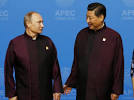Russia pivots east after signing mega-gas deal with China
Russia pivoted decisively towards the East on Sunday, after signing another mega-energy agreement with China, which could dwarf Europe as the largest consumer of Russian gas once the project is completed.
Russian President Vladimir Putin’s fifth meeting in a year with his Chinese counterpart, Xi Jinping, on the sidelines of the summit of the Asia-Pacific Economic Conference (APEC), yielded an agreement that seemed to rebuff Europe, which had imposed sanctions on Russia following the crisis in Ukraine.
China would receive 30 billion cubic meters (bcm) of gas per year along the so-called “western” or “Altay” route, according to the agreement. This would supplement the proposed 38 bcm Russian gas to China that would flow through the “Power of Siberia” pipeline, passing along the “eastern route”. The “eastern route” deal, worth $400 billion, was signed in May, and work on the project has already commenced.
Sunday’s agreement is meant to lay the groundwork for a full-fledged contract later. “We have reached an understanding in principle concerning the opening of the western route,” said Mr. Putin, before he flew into Beijing for the APEC summit. “We have already agreed on many technical and commercial aspects of this project, laying a good basis for reaching final arrangements,” he observed.
Aleksey Miller, a senior member of Mr. Putin’s inner circle and head of the energy giant Gazprom, announced that once it materialises, the deal would hedge Moscow’s dependence on the European energy markets. “After we have launched supplies via the “western route,” the volume of gas deliveries to China can exceed the current volumes of export to Europe,” he observed.
Analysts point out that China is pushing for Russian gas supplies, sent along a more secure land corridor, apprehending that shipments of oil and gas along the sea route are now more vulnerable to disruption after the United States announced its China-centric “Asia Pivot” military doctrine.
With energy as the focus, Mr. Putin’s visit resulted in another agreement that could allow the firm China National Oil and Gas Exploration and Development to take a 10 percent stake in Vancorneft, which is part of Rosneft, another Russian energy giant.
The two leaders also discussed ways to lower critical dependence on the western financial system, by discussing payments in Chinese Yuan, for products, that include military hardware, RIA Novosti reported. The United States is already miffed with China for steering the formation of the $ 50 billion Asian Infrastructure Investment Bank (AIIB), slamming the initiative, controlled by Beijing, as duplicating the work of western-backed World Bank.
Source: The Hindu News




